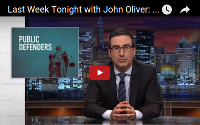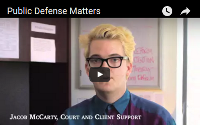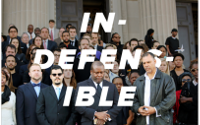OPD Staff Attorney Tina Peng talks about the realities and struggles of a continued budget crisis.
 The Orleans Public Defenders are facing a million-dollar deficit as a result of statewide budget cuts. For a small office like ours, that’s devastating. To avoid layoffs, the entire staff will see the equivalent of four unpaid weeks per year in furloughs, increased caseloads and a hiring freeze — and the submission to the Louisiana Public Defender Board of a plan to cut services to the people of New Orleans. We are already stretched thin: Our office represents 85 percent of the people charged with crimes in Orleans Parish but has an annual budget about a third the size of the district attorney’s. The American Bar Association recommends that public defenders not work on more than 150 felony cases a year. In 2014, I handled double that.
The Orleans Public Defenders are facing a million-dollar deficit as a result of statewide budget cuts. For a small office like ours, that’s devastating. To avoid layoffs, the entire staff will see the equivalent of four unpaid weeks per year in furloughs, increased caseloads and a hiring freeze — and the submission to the Louisiana Public Defender Board of a plan to cut services to the people of New Orleans. We are already stretched thin: Our office represents 85 percent of the people charged with crimes in Orleans Parish but has an annual budget about a third the size of the district attorney’s. The American Bar Association recommends that public defenders not work on more than 150 felony cases a year. In 2014, I handled double that.
The United States accounts for less than 5 percent of the world’s population but almost 25 percent of the global prison population. The vast majority of people in prison are indigent: The Justice Department has estimated that 60 to 90 percent of criminal defendants nationwide cannot afford their own attorneys and that in 2007, U.S. public defender offices received more than 5.5 million cases.
Public defenders are the only ones who stand up for the vast majority of people charged with crimes in America, and we try to help our clients achieve justice in an often unfeeling legal system that disproportionately ensnares poor people and minorities. But the constitutional guarantee of effective representation for all has fallen short. The funding crisis is nationwide, and it is dire. When people ask how to push back against police misconduct, how to decrease the costs of mass incarceration and how to ensure fairer treatment of our nation’s most disenfranchised citizens, part of the answer lies in fully funding public defender’s offices and enabling us to represent our clients in a meaningful manner.
I went to law school to be a public defender. My frustration with our office’s persistent underfunding is not that it forces me to work long hours, represent numerous clients or make far less money than I would at a private law firm. It is that when we are constantly required to do more with less, our clients suffer.
Because we don’t have enough lawyers on staff, the week I passed the bar in 2013, I began representing people facing mandatory life sentences on felony charges. In Louisiana, people with as few as two prior nonviolent felony convictions can face mandatory life imprisonment on charges as minor as possession of a syringe containing heroin residue or, until recently, possession of a single joint. Defendants who cannot afford to make bond can sit in jail for 60 days while the district attorney decides whether to arraign them. An unconstitutionally high caseload means that I often see my new clients only once in those two months. It means that I miss filing important motions, that I am unable to properly prepare for every trial, that I have serious conversations about plea bargains with my clients in open court because I did not spend enough time conducting confidential visits with them in jail. I plead some of my clients to felony convictions on the day I meet them. If I don’t follow up to make sure clients are released when they should be, they can sit in jail for unnecessary weeks and months.
Local constraints exacerbate these problems. Saying it lacks resources to provide adequate mental health treatment in its jails, the Orleans Parish Sheriff’s Office has moved our clients with high mental health needs to a prison more than an hour away. Limited visitation hours make it almost impossible to see clients there on days we need to be in court. And recent attrition, coupled with the hiring freeze, has rendered many lawyers overwhelmed by cases transferred to them on top of their existing ones. One attorney whose transferred client was jailed on a bail-jumping charge did not have a chance to look at the file for close to a month, when the client’s next court date approached. At that point, he realized that the client had never been served to appear for the court date on which he allegedly jumped bail. The attorney immediately and successfully moved for the judge to release the client. By then, though, “he had a newborn baby he didn’t see, because I didn’t look at the case for a month,” the attorney said.
For other clients, my office considers how serious their cases are before deciding how many resources to devote to them. We have only nine investigators to handle more than 18,000 felony and misdemeanor cases each year. One investigator describes being so overwhelmed that he is often unable to canvass for relevant surveillance footage until it has already been deleted. Another investigator said that recently, in a span of a week and a half, she was assigned three cases carrying sentences of mandatory life without parole. A year ago, she would have received one such assignment a month. Those cases all had preliminary examinations — the only pre-indictment hearing at which the client’s attorney can cross-examine police officers — in the same week. Working around the clock, the investigator completed full investigations for two of those cases. For the third, she was able only to knock on one witness’s door twice.
We similarly have to ration our social work and client welfare services. Cutbacks mean we are limited in our ability to gather detailed information about our clients’ personal circumstances and histories to present to prosecutors, which could lead to more individualized plea agreements. We are also hobbled in our capacity to make sure critical services are delivered to our clients in jail.
Unfortunately, budget cuts and a spiraling workload are not unique to Orleans Parish. Funding problems threaten poor people’s right to counsel across America.
In June, the American Civil Liberties Union sued Idaho, claiming that the state has failed to fund or improve its broken public defense system and has deprived indigent residents of their Sixth Amendment right to adequate legal representation. Indigent defendants in most counties there have no lawyers at their first court appearances, where bail is set and pleas of guilty or not guilty are entered, according to the lawsuit. Many counties also pay attorneys who accept public defense contracts a flat fee, regardless of the number or seriousness of the cases each lawyer handles. Some public defenders in Idaho carry caseloads that are double national standards. And because public defenders are often allowed to continue their own private practices, there is little incentive for them to spend much time on their appointed clients, or to pay for investigations or expert witnesses in those cases, a common problem everywhere.
None of that is constitutionally adequate, says Jason Williamson, one of the ACLU’s lead attorneys in the Idaho lawsuit. “You need to do more than have a pulse,” he says. “You need to actually litigate these cases.”
Some public defender’s offices have contemplated the drastic option of turning down appointments. In Louisiana, for example, offices may start putting lower-priority clients — people who are out of jail or have less-complicated cases — on a waiting list for representation, says James Dixon, the state public defender. That would mean defendants would have to come to court without lawyers to argue, file motions, or conduct hearings or trials for them, effectively bringing their cases to a halt.
Courts have mostly supported this option. In 2013, the Florida Supreme Court ruled that public defender’s offices can apply to turn down future appointments when their caseloads rise so high that they cannot constitutionally represent all their clients. At the time, public defenders in Miami were handling 400 felony cases each, and some often had up to 50 cases set for trial in a week. Missouri’s Supreme Court in 2012 also upheld the ability of public defenders in that state to decline appointments if they were too far over capacity. A few months later, most Missouri public defender’s offices stopped accepting cases for one to two months, according to State Public Defender Michael Barrett. If the courts did not appoint private lawyers to take on cases for free, overflow defendants had no representation at all until the public defenders were able to start accepting appointments again.
In Louisiana, one of our biggest problems is unstable funding: This is the only state in America that tries to fund most public defense services with fees associated with traffic tickets, parish by parish. But other states with steadier funding are seeing even the status quo come under attack. Since 1992, Tennessee counties have been required to raise public defenders’ budgets by 75 percent of any increase in prosecutors’ budgets. This year, a bill requested by the state’s district attorneys would repeal that law. “It’s an issue of fairness,” says Mark Stephens, the Knox County district public defender. “It frustrates me that they can’t understand that they need money and we need money.”
Ultimately, it’s easy to forget what we’re talking about when we talk about the criminal justice system. I’ve been asked by my family members, my friends and my hairdresser why I represent criminals. The answer is that I, and other public defenders, don’t represent criminals. We represent poor people who are facing criminal charges — charges on which they are presumed innocent until proven guilty in court. We represent members of our communities who have a right to real and meaningful legal representation, even if they are poor. My clients, like the millions of other people in the United States who are currently represented by public defenders, deserve better.




